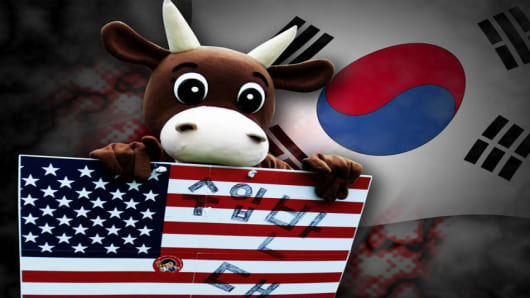South Korea will allow the resumption of U.S. beef imports starting Thursday under new quarantine rules that will exclude meat from cattle older than 30 months old, the president's ruling party said on Wednesday.
South Korea and the United States at the weekend said they had reached a private-sector deal to restrict trade in U.S. beef to cattle under 30 months and forbid exports of parts that are thought to pose a higher risk of mad cow disease.
Once the legal notice for the resumption is published on Thursday, U.S. beef that has been in frozen storage in South Korea for months could be inspected and then head to store shelves.
But government officials said they do not expect importers to immediately request quarantine checks.
"At the high-level party-government meeting today, it was decided that the agriculture minister will request the publication of the legal notice today and it will be published in the government newsletter tomorrow," ruling Grand National Party spokeswoman Cho Yoon-sun said in a statement.
South Korean officials said the reworked pact would increase safety checks on U.S. beef, but hours after it was announced, a violent rally erupted in central Seoul with protesters smashing police buses blocking the way to the presidential Blue House.
President Lee Myung-bak's popularity has plummeted since his government signed a deal in April to allow the import of U.S. beef from cattle of all ages.
That deal sparked street protests among those concerned about mad cow disease that later mushroomed into nearly nightly protests against Lee's government.
The government sought to rework of the deal to allay public concerns about any perceived threat from mad cow disease, which can trigger a rare but fatal brain wasting disease in humans.
Last week, Lee apologized for the original agreement, promised a fresh start for his four-month-old government and sacked most of his top aides.
The White House said on Tuesday that President George W. Bush would not visit South Korea next month. Analysts said the White House was likely concerned that a visit planned for early July could further strain ties.


